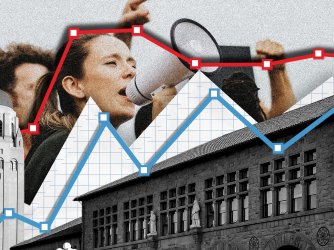Table of Contents
Student Activism Roundup Highlights Continued Need for Speech Code Reform

Debates on America’s college campuses should be remarkable for their substance alone—not because they were allowed to happen in the first place.
Yet, when we at FIRE hear that students—at one campus or another, on one issue or another, in one way or another—successfully voiced their opinion on a controversial matter, it is a welcome break from the reports of censorship that typically fill our days.
It shouldn’t be that way.
But it was, once again, when Inside Higher Ed published its roundup earlier this week of the latest “campus protests, college vigils and statements from academic organizations” happening around the country. Campus communities are responding to the headline-making shooting deaths of Alton Sterling in Baton Rouge and Philando Castile outside Minneapolis, and the allegedly retaliatory shooting deaths of five police officers at a peaceful Dallas-area event protesting Sterling and Castile’s deaths.
Students held a Black Lives Matter march at the University of Oregon, a rally at the University of Texas at El Paso, and a vigil at the University of Kentucky. The University of Denver organized a discussion, as did Vanderbilt University, where students have been critical of conservative African-American professor Carol Swain’s remarks that the Black Lives Matter movement is “very destructive” and “Marxist.” While Vanderbilt distanced itself from the comments, the school said it remains committed to Swain’s right to academic freedom. The Massachusetts Institute of Technology’s official admissions web page posted a student-authored blog entry reflecting on the shootings and the subject of race.
As always, FIRE takes no position on the substance of the speech on these campuses. But we work hard to ensure that students and faculty enjoy the right to get their message across, whatever it may be. And we were, indeed, pleasantly surprised to see free speech at work on these campuses, because all too often, it is suppressed.
The culprit in many of these cases is restrictive “speech codes.” Speech codes are policies that restrict campus speech in violation of the First Amendment or institutional promises of free speech and, in turn, could be used to block important dialogue. According to our 2016 Spotlight on Speech Codes report, almost half (49.3 percent) of the 440 colleges and universities we analyzed “maintain policies that seriously infringe upon the free speech rights of students.”
There are many recent examples of these speech codes in action. For example, students at the University of South Carolina were interrogated for numerous policy violations after organizing an event touting the benefits of (of all things!) free speech, Emory University suggested it would investigate students for conduct code violations for writing pro-Donald Trump chalk messages on sidewalks, and Louisiana State University professor Teresa Buchanan was targeted under a policy containing language that is now mandated by the federal government as part of its efforts to enforce Title IX.
College campuses ought to be citadels of debate in our society. As the recent Black Lives Matter protests demonstrate, campus communities want opportunities to discuss these important issues. And campuses are the very place where this right should be most protected. After all, universities exist for the purpose of creating and sharing knowledge. And, as we’ve known as far back as the Enlightenment, the best way to get to that knowledge is to vet ideas, one by one, until we arrive at the best ones. Speech codes seriously harm this process by deeming some ideas unfit for discussion.
But there’s hope.
FIRE works directly with schools to reform bad policies. Already this year, we assisted four schools in reforming all of their speech codes. Each of those schools now earns FIRE’s highest, “green light” rating. And you can make a difference, too. Check out how your school’s speech codes are rated in our comprehensive Spotlight database. Then let administrators there know what policies you’d like to see reformed.
For as long as the existence of free and open debate on college campuses remains pleasantly surprising—rather than a foregone conclusion—FIRE will be here to help.
Recent Articles
FIRE’s award-winning Newsdesk covers the free speech news you need to stay informed.

A third of Stanford students say using violence to silence speech can be acceptable

Stanford president and provost cheer free expression in open letter to incoming class

FIRE survey shows Judge Duncan shoutdown had ‘chilling effect’ on Stanford students
